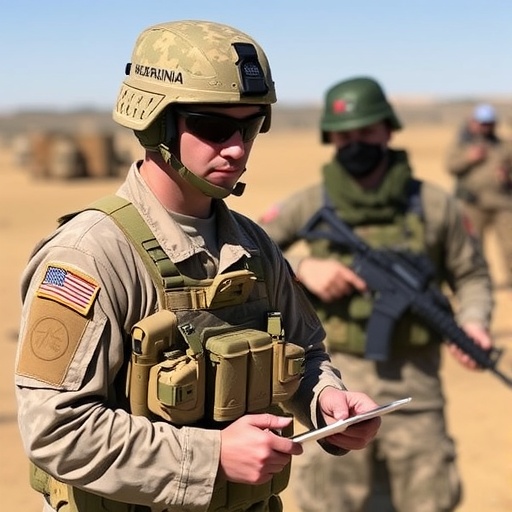A groundbreaking research initiative at The University of Texas at Arlington (UTA) is set to explore the transformative potential of situational judgement tests (SJTs) in enhancing soldier ingenuity under high-pressure and resource-limited circumstances. This innovative project aims to push the boundaries of psychological assessment tools, moving beyond their traditional predictive roles toward impactful training applications that cultivate adaptive, creative problem-solving in complex military environments.
Dr. Michelle Martín-Raugh, a psychology professor at UTA and director of the Employee Assessment, Selection, and Training Lab, is spearheading this investigation alongside her colleague, Professor Logan Watts. They emphasize the critical need for soldiers to develop innovative thinking that enables them to navigate scenarios where resources are scarce and conventional solutions are unavailable. Unlike prior uses of SJTs, which primarily focus on evaluating personnel suitability, this study seeks to leverage SJTs as immersive training mechanisms designed to instill cognitive flexibility and resourcefulness.
The two-year, Army Research Institute-funded project unfolds in two distinct phases. The initial year concentrates on developing nuanced situational scenarios through collaboration with subject matter experts (SMEs) intimately familiar with frontline military challenges. These scenarios encapsulate real-world dilemmas, capturing both technical and social intricacies that soldiers regularly confront. The second year plans involve rigorous empirical evaluation of SJT-based training efficacy at multiple military installations, testing whether these engineered simulations effectively foster enhanced problem-solving skills in active soldiers.
At the core of this initiative lies the unique fidelity of SJTs—their remarkable alignment with actual human behavior in real contexts. Dr. Martín-Raugh elucidates this by describing SJTs as tools capable of mirroring authentic decision-making processes encountered by soldiers. By extracting detailed insights from SMEs on optimal and suboptimal response strategies, the researchers aim to establish a rich framework for training modules that simulate realistic, high-stakes judgment calls. This fidelity is pivotal to bridging theoretical instruction with frontline applicability.
The technical scenarios crafted in this project delve into situations demanding inventive mechanical and tactical solutions. For example, soldiers may be tasked with breaching a secured entrance without standard equipment, requiring them to ideate unconventional methodologies under pressure. These exercises are designed not merely to assess competence but to push cognitive boundaries, compelling soldiers to engage in lateral thinking and innovation—a crucial asset for unpredictable combat environments.
Beyond technical challenges, the social dynamics of military operations are also a focal point. One scenario type involves managing units that face personnel shortages and must effectively repurpose roles and responsibilities. Here, the test probes the soldiers’ social acumen, leadership, and adaptability within teamwork contexts. The incorporation of interpersonal problem-solving underscores the multidimensional nature of military ingenuity, highlighting emotional intelligence alongside tactical prowess.
Crucially, the ability to navigate these complex scenarios with creativity and precision stands to significantly improve mission success rates and safety outcomes. Drawing an analogy to agricultural ingenuity, where farmers adaptively reconcile weather unpredictability and resource scarcity through experience-honed strategies, the researchers envision SJTs as a cognitive analog for military innovation. This experiential learning framework equips soldiers to anticipate and creatively respond to emergent challenges that defy rote solutions.
The comprehensive assessment of SJTs also recognizes their dual capacity to gauge technical know-how and social problem-solving in tandem. By measuring how individuals confront multifaceted, sometimes ambiguous situations requiring both procedural skill and ethical, interpersonal judgment, these tests enable a holistic evaluation of soldier readiness. This balanced approach reflects modern military demands that increasingly prioritize flexible thinkers capable of navigating the fuzzy complexities of engagement.
In addition to bolstering military effectiveness, the implications of this work extend to other high-stakes professions where rapid, creative decision-making under duress is paramount. Firefighters, law enforcement officers, and emergency medical personnel operate within resource-constrained, high-pressure contexts where differential problem-solving approaches can be lifesaving. The adaptability cultivated by SJT-based training may thus represent a cross-sector innovation with broad societal benefits.
UTA’s role in this pioneering research is emblematic of its larger stature as a Carnegie R-1 research university deeply engaged in advancing scientific knowledge with practical impact. Positioned in the vibrant Dallas-Fort Worth metroplex, UTA combines its extensive academic resources with a commitment to addressing pressing societal challenges, demonstrated by securing competitive funding from the Army Research Institute for this project. The initiative underscores UTA’s growing influence in shaping psychological science applications for real-world efficacy.
As the research progresses, the team anticipates that their findings will contribute substantially to the evolving discourse around employee assessment, cognitive training, and operational readiness. By redefining SJTs as dynamic training tools rather than static selection instruments, this work challenges prevailing paradigms and offers a pathway toward cultivating a military force equipped not only with technical skill but also enhanced cognitive agility and resilience.
Ultimately, this research embodies a strategic fusion of psychological theory, empirical rigor, and practical necessity, setting a precedent for how psychological science can drive innovative training methodologies in complex operational spheres. The anticipation surrounding the project is heightened by the potential ripple effects across allied professional domains, marking it as a seminal advancement in applied behavioral science.
Subject of Research: Evaluation and Training of Soldier Ingenuity Using Situational Judgement Tests (SJTs)
Article Title: Enhancing Military Ingenuity Through Situational Judgement Test-Based Training: A UTA-Led Initiative
News Publication Date: Not specified
Web References: Not provided
References: Not included
Image Credits: None
Keywords: Psychological science, Behavioral psychology, Stress management, Moral judgement, Social sciences, Military training, Situational judgement tests, Soldier ingenuity, Resource-constrained problem-solving, Cognitive flexibility, High-stakes decision-making




